Letras Boricuas Fellows
Versión en español aquí.
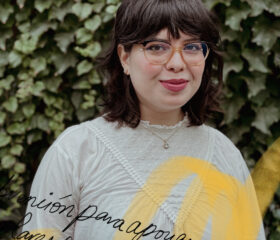

Ivelisse Álvarez
Ivelisse Álvarez nació en Ponce, Puerto Rico, y actualmente vive en Ithaca. Es escritora y crítica literaria, coeditora de la revista Demoliendo Hoteles, dibujante de guiones gráficos y estudiante de grado en el Departamento de Estudios Románicos de la Universidad de Cornell. Es autora de Princesa Posguerra (Espejitos de Papel Editores, 2015) y La tomadora de soda (Ediciones Aguadulce, 2018). Ha colaborado en la antología Pedir un deseo, prenderle fuego (Ediciones Continente, 2020) y en la octava edición de La Pequeña.
Como crítica, ha reseñado literatura puertorriqueña en intervenciones como: «El lírico como lector» (Demoliendo Hoteles, 2022), «FINALISTA: Nova Provincia de Pablo Figueroa» (Latin American Literature Today, 2024), «Tentativas sobre sikitrake*» (Demoliendo Hoteles, 2024) y «Leer a oscuras» (La Pequeña, 2025).Actualmente, trabaja en su próximo libro de poemas, Lo que no mata regresa.
“Recibir esta beca significa para mí la posibilidad de aunar nuevos esfuerzos con mis amigues de Demoliendo Hoteles, de seguir interviniendo desde prácticas literarias y críticas que nos fisuren y nos miren a los ojos”.
Ivelisse Álvarez was born in Ponce, Puerto Rico; she currently lives in Ithaca. She is a writer and literary critic, co-editor of the magazine Demoliendo Hoteles, a graphic script artist, and an undergraduate student in the Department of Romance Studies at Cornell University.
She is the author of Princesa Posguerra (Espejitos de Papel Editores, 2015) and La tomadora de soda (Ediciones Aguadulce, 2018), and has contributed to the anthology Pedir un deseo, prenderle fuego (Ediciones Continente, 2020) as well as the eighth edition of La Pequeña. As a critic, she has reviewed Puerto Rican literature in pieces such as “El lírico como lector” (Demoliendo Hoteles, 2022), “FINALISTA: Nova Provincia by Pablo Figueroa” (Latin American Literature Today, 2024), “Tentativas sobre sikitrake*” (Demoliendo Hoteles, 2024), and “Leer a oscuras” (La Pequeña, 2025). She is currently working on her upcoming poetry collection, Lo que no mata regresa.
“To receive this fellowship means for me the possibility of joining new efforts with my friends from Demoliendo Hoteles, of continuing to intervene through literary and critical practices that crack us open and look us straight in the eye.”
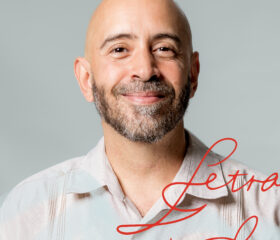

Hermes Ayala
Hermes Ayala nació en Hato Rey y se crio en la barriada Sandín, la urbanización San Demetrio y el barrio Los Naranjos, en Vega Baja, donde actualmente reside. Es escritor, periodista, productor, poeta, artista de Spoken Word, rapero y guionista.
Su trabajo se caracteriza por una propuesta conceptual de poesía hablada y storytelling rimado, con bases de Spoken Word, música y colaboraciones visuales de otros artistas. Entre sus piezas más destacadas se encuentran “Estadística”, “Ta Bueno Ya”, “Un Reloj”, “Aleluya”, “Despojo” y “Pa’l Kremlin”, todas parte del proyecto S.O.S.(i)ego: #elartedelhurto.
“Recibir esta beca significa muchísimo para mí, ya que me brinda la calma que necesito para crear mientras sigo cumpliendo con mis responsabilidades como cuidador”.
Hermes Ayala was born in Hato Rey and grew up in the Sandín neighborhood, the San Demetrio residential development, and the Los Naranjos sector of Vega Baja, where he currently lives. He is a writer, journalist, producer, poet, Spoken Word artist, rapper, and screenwriter.
His work is defined by a conceptual approach to spoken poetry and rhymed storytelling, blending Spoken Word with music and visual collaborations from other artists. Notable pieces include “Estadística,” “Ta Bueno Ya,” “Un Reloj,” “Aleluya,” “Despojo,” and “Pa’l Kremlin,” all part of his ongoing project S.O.S.(i)ego: #elartedelhurto.
“Receiving this grant means so much, as it guides me toward the calm I need to create while continuing to be a family caregiver.”
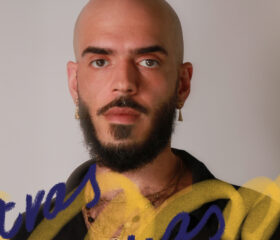

Gabriel Carle
Gabriel Carle nació en Río Piedras y actualmente vive en Bushwick. Es cuentista y poeta.
Sus narraciones han sido reconocidas en certámenes literarios de la Universidad de Puerto Rico (2013, 2016) y la Universidad de Houston (2019), y se han publicado o antologado en Puerto Rico, Estados Unidos, España y Alemania. Es autore de la colección de cuentos Mala leche (Alayubia, 2018), traducida al inglés por Heather Houde como Bad Seed (Feminist Press, 2024), y de la novela Folly (Alayubia, 2024).
Completó su maestría en Creative Writing in Spanish en la Universidad de Nueva York, donde actualmente imparte cursos de lengua y de literatura mientras culmina el doctorado en Estudios Culturales Caribeños.
“Letras Boricuas representa un compromiso de vida con la literatura, la escritura y la enseñanza de ambas. Pone en evidencia la inmensa diversidad de voces y caminos que componen la puertorriqueñidad, whatever that means. Recibir esta beca es uno de mis mayores logros porque viene junto con la validación de pares, mentores y amigues en el campo, porque afirma y fortalece las comunidades (y los márgenes) que he tenido el privilegio de transitar. Se lo dedico a mis amigues, a mis vicios, a mis polvos y desamores, a mis traumas familiares y medioambientales y a mi isla paraíso en ruinas, porque todo ese ruido me acompaña a diario, me define, y eso también es literatura”.
Gabriel Carle was born in Río Piedras; they currently live in Bushwick. Gabriel is a short story writer and poet. Their literary fiction work has received awards from the University of Puerto Rico (2013, 2016) and the University of Houston (2019), and has been published or anthologized in Puerto Rico, the United States, Spain, and Germany. They are the author of the short story collection Mala leche (Alayubia, 2018), translated into English by Heather Houde as Bad Seed (Feminist Press, 2024), and of the novel Folly (Alayubia, 2024).
Carle completed a master’s degree in creative writing in Spanish at New York University, where their currently teaches language and literature courses while finishing their Ph.D. in Estudios Culturales Caribeños.
“Letras Boricuas represents a lifelong commitment to literature, writing, and the teaching of both. It foregrounds the immense diversity of voices and paths that make up Puerto Ricanness, lo que sea que eso signifique. Receiving this fellowship is one of my greatest achievements because it comes with the validation of peers, mentors, and friends in the field, because it affirms and strengthens the communities (and the margins) that I’ve had the privilege of inhabiting. This one goes out to my friends, my vices, my lovers and heartbreaks, my environmental and family traumas, and my island paradise in ruins, for I carry all that noise with me every day, it defines me, and that, too, is literature.”
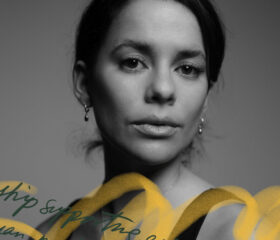

Karina Curet
Karina Curet nació en Caguas y actualmente vive en Brooklyn, Nueva York. Es dramaturga, actriz y escritora. Su obra teatral más reciente, Casa Cristo (aún no publicada), profundiza en la exploración de identidades y realidades puertorriqueñas. Sueña con seguir escribiendo y produciendo historias situadas en contextos profundamente boricuas, pero que a la vez aborden temas universales que reflejan la humanidad compartida que todos enfrentamos.
“Recibir esta beca significa que han depositado en mí una cantidad inmensa de valentía y coraje para continuar explorando mis ideas. Para mí, escribir es como un salto al vacío con el corazón en la mano, y tener el apoyo y la seguridad de la Fundación Flamboyán y Mellon Foundation me reafirma que puedo y debo continuar cultivando historias y que el teatro puertorriqueño está siendo celebrado y sostenido de una manera muy bonita mediante esta beca”.
Karina Curet was born in Caguas, and currently lives in Brooklyn, New York. She is a playwright, actress and writer. Her most recent work, Casa Cristo (unpublished), delves into Puerto Rican identities and lived experiences. She dreams of continuing to write and produce stories rooted in distinctly Puerto Rican contexts while exploring universal themes that reflect the shared humanity, we all face.
“To receive this fellowship means that an immense amount of trust and courage has been placed in me to continue exploring my ideas. For me, writing is like a leap into the void with my heart in hand, and having the support and assurance of the Flamboyan Foundation and the Mellon Foundation reassures me that I can—and should—continue cultivating stories, and that Puerto Rican theater is being celebrated and sustained in a truly meaningful way through this fellowship.”
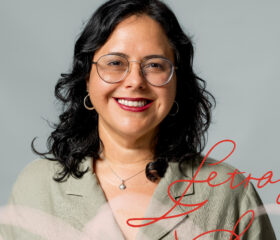

Nicole Cecilia Delgado
Nicole Cecilia Delgado nació en Río Piedras y se crio entre Guaynabo y Cupey. Actualmente vive en Isabela. Es poeta, editora, traductora, organizadora cultural y artista del libro. Entre sus publicaciones más recientes se encuentran a mano (La Impresora, 2023), adjacent islands (Ugly Duckling Presse, 2022) y periodo especial (Ediciones Aguadulce / La Impresora, 2019).
“Recibir esta beca significa para mí potenciar el alcance de mi escritura, en diálogo con mi comunidad”.
Nicole Cecilia Delgado was born in Río Piedras, she grew up between Guaynabo and Cupey, and currently lives in Isabela. She is a poet, editor, translator, cultural organizer, and book artist. Her recent publications include a mano (La Impresora, 2023), adjacent islands (Ugly Duckling Presse, 2022), and periodo especial (Ediciones Aguadulce / La Impresora, 2019).
“To receive this fellowship means for me the opportunity to expand the reach of my writing in dialogue with my community.”


Juanmanuel González-Ríos
Juanmanuel Gónzalez-Ríos nació en Arecibo y se crio —donde aún reside— en las parcelas Roberto Clemente I del sector Pajuil, barrio Buena Vista de Hatillo. Es escritor, ávido lector y profesor.
Entre sus publicaciones más recientes se destacan varios poemas incluidos en las antologías Poesía puertorriqueña: entre dos islas (La Comuna de Bello, Venezuela, 2015), Este juego de látigos sonrientes: poesía puertorriqueña de fines del siglo XX y comienzos del XXI (Espejitos de Papel Editores, 2015) y Espejismos de la palabra: 10 voces de la poesía puertorriqueña del nuevo milenio (Editorial Letras Salvajes, 2021). Es además autor de su cuarto y más reciente poemario, Ventriloquus (Editorial del Instituto de Cultura Puertorriqueña, 2015).
“Recibir esta beca ha significado, no sólo un imprevisto estímulo al siempre autogestionado y desinteresado quehacer que por muchos años he venido realizando, sino un significante motivo de carácter espiritual, pues de algún modo impulsa a que uno siga apostando aún a las sinuosas posibilidades del azar. Estoy sumamente agradecido y confiado, a la hora de tener que reciprocar, con que estoy a la altura de corresponder como es debido. Enhorabuena, pues”.
Juanmanuel González-Ríos was born in Arecibo, and he was raised—and continues to live—in the Roberto Clemente I neighborhood of the Pajuil sector, Buena Vista barrio, in Hatillo. He is a writer, avid reader, and professor.
His most recent publications include poems featured in the anthologies Poesía puertorriqueña: entre dos islas (La Comuna de Bello, Venezuela, 2015), Este juego de látigos sonrientes: poesía puertorriqueña de fines del siglo XX y comienzos del XXI (Espejitos de Papel Editores, 2015), and Espejismos de la palabra: 10 voces de la poesía puertorriqueña del nuevo milenio (Editorial Letras Salvajes, 2021). He is also the author of his fourth and most recent poetry collection, Ventriloquus (Editorial del Instituto de Cultura Puertorriqueña, 2015).
“Receiving this fellowship has meant not only an unexpected encouragement for the long years of self-directed and selfless work I have been carrying out, but also a deeply meaningful spiritual reason, as it somehow propels one to continue taking chances even amidst the winding possibilities of fate. I am profoundly grateful and confident that, when it comes time to give back, I will be able to respond as is proper. ‘Enhorabuena pues.’”
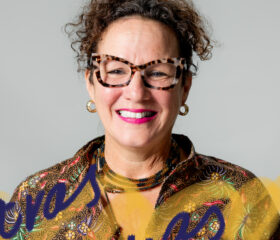

Teresa Hernández
Teresa Hernández nació en Santurce y se crio en Río Piedras y Cupey. Actualmente vive en Hato Rey. Es artista transdisciplinaria (teatro, performance, danza, video) cuyo trabajo emerge del cuerpo pensante en movimiento continuo, la imagen, el lenguaje del espacio y el juego con las palabras.
Entre sus publicaciones más recientes se encuentran Coraje II, en Puerto Rico Off: Teatro y Performance Fronterizos (Ed. Jennifer Duprey, Ediciones Laberinto, 2025); quienes tajan mar: registro de una práctica artística andariega (Editora Educación Emergente, 2023); Mimeologies (texto performático), traducido por Aurora Lauzardo, en Literature and Arts from the Americas. Contemporary Latin American and Latinx Theater, No. 104, editado por Priscilla Meléndez (2022); y La Cubana (monólogo), en The Puerto Rico Review, Vol. 2, No. 3 (2018).
“Un reconocimiento a una práctica artística que llevo al margen del arte comercial, industrial y tradicional y que ha sido fraguada, formada y deformada en nuestro archipiélago boricua, bajo la tutela de mujeres artistas de danza, teatro, performance, pintura y video, de voz contestaria. Al mismo tiempo, esta beca es un reconocimiento a las prácticas artísticas contemporáneas que no son de fácil categorización y otorga una visibilidad para el arte escritural que se encuentra en las fronteras del teatro y la performance. Este reconocimiento, a su vez, abona al hacer y al desarrollo del arte escénico expandido, radical e indomable”.
Teresa Hernández was born in Santurce. She grew up in Río Piedras and Cupey, and currently lives in Hato Rey. She is a transdisciplinary artist (theater, performance, dance, video) whose work arises from the thinking body in continuous motion, the image, the language of space, and the play of words.
Her recent publications include Coraje II, in Puerto Rico Off: Teatro y Performance Fronterizos (Ed. Jennifer Duprey, Ediciones Laberinto, 2025); quienes tajan mar: registro de una práctica artística andariega (Editora Educación Emergente, 2023); Mimeologies (performative text), translated by Aurora Lauzardo, in Literature and Arts from the Americas. Contemporary Latin American and Latinx Theater, No. 104, guest edited by Priscilla Meléndez (2022); and La Cubana (monologue), in The Puerto Rico Review, Vol. 2, No. 3 (2018).
“Letras Boricuas is a recognition of an artistic practice I have pursued on the margins of commercial, industrial, and traditional art—one that has been forged, shaped, and transformed in our Boricua archipelago under the guidance of women artists in dance, theater, performance, painting, and video, with a dissenting voice. At the same time, this fellowship is a recognition of contemporary artistic practices that resist easy categorization, granting visibility to written art that exists at the borders of theater and performance. This recognition, in turn, contributes to the creation and development of expanded, radical, and untamable performing arts.”
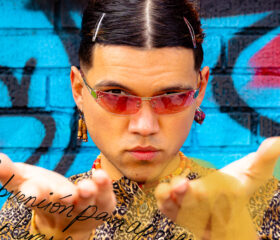

Mobéy Lola Irizarry
Mobéy Lola Irizarry se crio en Hartford, Connecticut, y actualmente vive en Brooklyn. Es poeta y performere experimental, además de músique enraizade en la salsa y la bomba. Entre sus trabajos más recientes se encuentran una presentación en La MaMa Experimental Theatre (2025), la canción “Como Me Quiero” del grupo Las Mariquitas (2025) y el EP “es un río, sé” (2024).
“Esta beca para mi es poder regresar a Borikén”.
Mobéy Lola Irizarry was raised in Hartford, Connecticut, and are currently living in Brooklyn. They are an experimental poet and performer, as well as a musician rooted in salsa and bomba traditions. Their recent works include a performance at La MaMa Experimental Theatre (2025), the song “Como Me Quiero” by Las Mariquitas (2025), and the EP “es un río, sé” (2024).
“Letras Boricuas is the way of returning to Borikén.”


Gegman Lee
Gegman Lee nació en Río Piedras y se crio entre San Juan y Carolina. Actualmente reside en Cupey. Es escritor y observador. Entre sus publicaciones más recientes se encuentran Elegía a los vencidos (Ediciones Callejón, 2018), Ya no hay extrañeza (Ediciones Alayubia, 2021) y El Castillo (Ediciones Alayubia, 2024).
“Letras Boricuas es para mí un reconocimiento de la poética que he desarrollado durante más de quince años y una oportunidad para invertir en el quehacer literario de la Isla”.
Gegman Lee was born in Río Piedras. He grew up between San Juan and Carolina and currently lives in Cupey. He is a writer and observer. His recent publications include Elegía a los vencidos (Ediciones Callejón, 2018), Ya no hay extrañeza (Ediciones Alayubia, 2021), and El Castillo (Ediciones Alayubia, 2024).
“For me, Letras Boricuas is a recognition of the poetics I have developed over more than fifteen years and an opportunity to invest in the Island’s literary practice.”
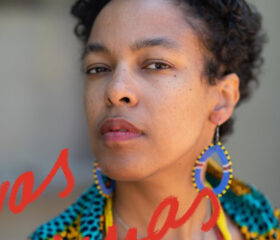

Raina J. León
Raina J. León nació en Filadelfia y se crio en el suroeste de la ciudad, entre la biblioteca Eastwick, el aeropuerto internacional de Filadelfia y la reserva natural John Heinz National Wildlife Refuge en Tinicum. Es poeta y actualmente vive en el noroeste de Filadelfia, en el área de Chestnut Hill, donde con frecuencia se le puede ver en Young American Cider organizando la serie de lecturas Wild Indigo Reading Series o en alguno de los parques que visitan sus hijos.
Entre sus publicaciones más recientes se encuentra black god mother this body (Black Freighter Press, 2022), además de poemas publicados en Abolition Journal, Academy of American Poets y en la antología conmemorativa del 30.º aniversario de la serie Monday Poets de la Free Library of Philadelphia.
“Recibir esta beca me ha hecho reír entre lágrimas. Una de mis titis, cuando era niña y leía mientras caminaba de regreso a casa desde la escuela, siempre me decía que guardara el libro y prestara atención al mundo a mi alrededor. Esta beca es la validación de esa niña y de Titi, porque siempre hemos estado observando el mundo, vivificados también por lo que se encuentra en los libros y en las ideas. Todo mi pueblo, ancestros en la tierra y aún compartiendo un mismo aliento, afroboricua, taína, todo nuestro pueblo, debe celebrar este momento de bienvenida. Estamos aquí, sosteniendo el pasado con la chispa de la creación. Todavía nerds, raros, excéntricos, escuchando, escribiendo y creando. Estoy emocionada por las oportunidades que se abrirán para mí… y para otros escritores emergentes como yo”.
Raina J. León was born in Philadelphia. She grew up in Southwest Philadelphia, between the Eastwick Library, the Philadelphia International Airport, and the John Heinz National Wildlife Refuge at Tinicum. She is a poet and now lives in Northwest Philadelphia, in the Chestnut Hill area, and can often be found at Young American Cider hosting the Wild Indigo Reading Series or at one of the many playgrounds her children frequent.
Recent publications include black god mother this body (Black Freighter Press, 2022), as well as poems featured in Abolition Journal, Academy of American Poets, and the 30th Anniversary chapbook celebrating the Monday Poets series at the Free Library of Philadelphia.
“To receive this fellowship has brought me to giggles while weeping. One of my titis (aunties) when I was a girl, reading while I walked home from school, would always tell me to put the book away and keep my eyes on the world around me. This is the validation of that little girl and of Titi, because we have always kept our eye on the world, enlivened, too, through what can be found in books and ideas. All my people, ancestors on the earth and still sharing one breath, Afro-Boricua, Taíno, all our people, must celebrate this moment of welcome. We are here, holding the past with the spark of creation. Still nerdy and weird and eccentric and listening and writing and crafting. I’m excited for what opportunities will open up for me … and the other rising writers like me.”
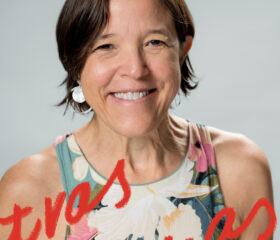

Tere Martínez
Tere Martínez nació y se crio en Río Piedras, San Juan, y actualmente reside entre Nueva York y San Juan. Es dramaturga y educadora puertorriqueña.
Su publicación más reciente es “Mi última noche con Rubén Blades”, incluida en la antología Teatro Latino: Nuevas Obras de los Estados Unidos (La Casita Grande, 2019).
Sus obras han sido producidas tanto en Estados Unidos como en Puerto Rico. Entre sus créditos se encuentran Paradise (La Lengua Teatro), Chain Reaction (Hostos Repertory Theater/CUNY), Borinquén vive en El Barrio (Hostos Repertory Theater, PRTT, TeatroStageFest, Teatro Rodante La Perla), Mi última noche con Rubén Blades y For mi chichí (Pregones Theater, Centro de Bellas Artes Luis A. Ferré).
“Esta distinción me permitirá, por fin, dedicarme a completar dos publicaciones que vengo trabajando desde hace un tiempo (más de una década): una selección de mi escritura escénica –Lo mío es otro teatro– y un texto reflexivo sobre mi práctica transdiciplinaria –Alter-alterna-alterada”.
Tere Martínez was born and raised in Río Piedras, San Juan, and currently divides her time between New York and San Juan. She is a Puerto Rican playwright and educator.
Her most recent publication is “Mi última noche con Rubén Blades,” featured in Teatro Latino: Nuevas Obras de los Estados Unidos (La Casita Grande, 2019).Her plays have been produced both in the United States and Puerto Rico. Credits include Paradise (La Lengua Teatro), Chain Reaction (Hostos Repertory Theater/CUNY), Borinquén vive en El Barrio (Hostos Repertory Theater, PRTT, TeatroStageFest, Teatro Rodante La Perla), Mi última noche con Rubén Blades, and For mi chichí (Pregones Theater, Centro de Bellas Artes Luis A. Ferré).
“This distinction will finally allow me to dedicate myself to completing two works I have been developing for some time (over a decade): a selection of my stage writing—Lo mío es otro teatro—and a reflective text on my transdisciplinary practice—Alter-alterna-alterada.”
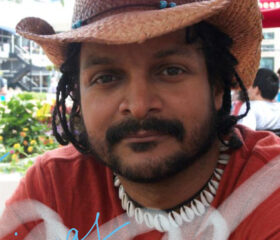

Tony Medina
Tony Medina nació en el South Bronx y se crio en los proyectos de vivienda Throgs Neck. Es veterano del Ejército de los Estados Unidos. Obtuvo su maestría y doctorado en Binghamton University y actualmente es Subdirector y Director de Escritura Creativa en Howard University.
Es autor y editor de múltiples géneros, con 24 libros publicados para adultos y jóvenes. Entre sus reconocimientos se incluyen el Nikki Giovanni Award del National Black Writers Conference y una proclamación del Estado de Nueva York por logros literarios. Su poesía y prosa han aparecido en más de 170 antologías y revistas. Entre sus trabajos más recientes se encuentran I Am Alfonso Jones (novela gráfica), Che Che Colé (ficción), Because the Sky (poesía) y Tetas de Vaca (ICE ICE, Baby) (obra de teatro).
“La importancia de la Beca Letras Boricuas Mellon/Flamboyán radica no solo en validar la labor literaria de los boricuas en la isla y en el continente, sino también en crear un puente entre ambos—y, por extensión, fomentar un diálogo intergeneracional y sostener las ricas tradiciones literarias que nuestro pueblo continúa cultivando a lo largo de la diáspora”.
Tony Medina was born in the South Bronx and raised in the Throgs Neck Housing Projects, Tony Medina is a United States Army veteran. He earned his master’s and PhD at Binghamton University and currently serves as Associate Chair and Director of Creative Writing at Howard University.
A multi-genre author and editor, he has published 24 books for adults and young readers. His honors include the National Black Writers Conference Nikki Giovanni Award and a State of New York Proclamation for literary achievement. Medina’s poetry and prose have appeared in over 170 anthologies and journals. His recent works include I Am Alfonso Jones (graphic novel), Che Che Colé (fiction), Because the Sky (poetry), and Tetas de Vaca (ICE ICE, Baby) (play).
“The importance of the Letras Boricuas Mellon/Flamboyán Fellowship is that it not only validates the literary artistry of Boricuas on the island and the mainland, but it also creates a bridge between the two—and by extension extends the generation conversation and the great literary traditions our people continue to create throughout the diaspora.”
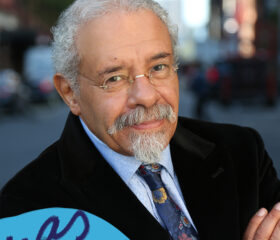

Jesús-Papoleto Meléndez
Jesús-Papoleto Meléndez nació en Queens, Nueva York. Se crio en la calle 111, entre la Segunda y la Tercera avenida, en el corazón de El Barrio, hasta que su familia se mudó al Bronx. Es poeta, performero, artista de Spoken Word y profesor.
Entre sus obras se encuentran Casting Long Shadows (1970), Have You Seen Liberation? (1971), Street Poetry & Other Poems (1972), Concertos on Market Street: Poems (1993), Hey Yo! Yo Soy! 40 Years of Nuyorican Street Poetry, A Bilingual Edition (2012) y PAPOLiTICO: Poems of a Political Persuasion (2018).
“Primero y ante todo, me enorgullece ser puertorriqueño. Finalmente siento la sensación de familia, un abrazo. Me siento reconocida como artista puertorriqueño, no solo como nuyorican. Mantener la cultura para mí ha sido una serie de descubrimientos, como buscar conchas bajo las piedras en la playa. Esto, sin embargo, se siente como un abrazo, una afirmación de amor largamente esperada. Puedo volver a mirar al sol. Tengo muchas ganas de ir a Puerto Rico”.
Jesús-Papoleto Meléndez was born in Queens, New York. He grew up on 111th Street, between 2nd and 3rd Avenue, in the heart of El Barrio, until his family moved to the Bronx. He is a poet, performer, Spoken Word artist, and educator.
Among his works are Casting Long Shadows (1970), Have You Seen Liberation? (1971), Street Poetry & Other Poems (1972), Concertos on Market Street: Poems (1993), Hey Yo! Yo Soy! 40 Years of Nuyorican Street Poetry, A Bilingual Edition (2012), and PAPOLiTICO: Poems of a Political Persuasion (2018).
“First and foremost, it makes me proud to be a Puerto Rica. I finally feel like family, un abrazo. I feel Recognized as a Puerto Rican artist not just Nuyorican. Keeping culture for me was a series of discoveries, like looking for seashell beneath stones along the beach. This, however, feels like a hug, a long-awaited affirmation of love. I can look into the sun again. I am very much forward to going to Puerto Rico.”
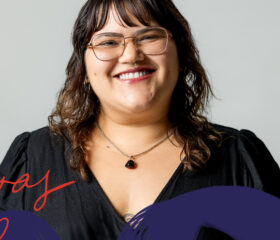

melissa orsini
melissa orsini nació en Ponce, se crio en Juana Díaz y actualmente vive en Morovis. Es artista interdisciplinaria, poeta, cantautora, actriz y gestora cultural. Entre sus publicaciones más recientes se encuentran NO QUIERO VIVIR EN UNA BOCINA (autopublicación, zine, 2025) y las flores del campo de batalla (autopublicación, zine, 2024).
“Recibir esta beca significa para mí un privilegio que valoro y una gran oportunidad para enfocar mi energía en crear libremente y por fin ponerle pausa al ‘modo supervivencia’ en el que sé que nos encontramos mucha gente”.
melissa orsini was born in Ponce, raised in Juana Díaz, and currently living in Morovis. They are an interdisciplinary artist, poet, singer-songwriter, actress, and cultural organizer.
orsini’s recent publications include NO QUIERO VIVIR EN UNA BOCINA (self-published zine, 2025) and las flores del campo de batalla (self-published zine, 2024).
“To receive this fellowship means to me a privilege I value and a great opportunity to focus my energy on creating freely and finally put a pause on the ‘survival mode’ that I know many of us find ourselves in.”


Joel Perez
Joel Perez nació en Boston y se crio en Lawrence, Massachusetts. Vive en Nueva York. Es actor, dramaturgo, guionista y director. Entre sus trabajos recientes se destacan: Beautiful, FL (2023, Disney+), Stir (2024, estreno mundial The Old Globe Theater), Villa Encanto (2025, estreno mundial Tribeca Film Festival), The Upper Room (2025, estreno mundial Newfest).
“Recibir esta beca significa para mí que cuento con el capital necesario para invertir en mis proyectos creativos y seguir avanzando hacia la creación de más oportunidades para artistas subrepresentados”.
Joel Perez was born in Boston, raised in Lawrence, Massachusetts, and is currently living in New York City. He/They are an actor, playwright, screenwriter, and director. Recent works include Beautiful, FL (2023, Disney+), Stir (2024, World premiere The Old Globe Theater), Villa Encanto (2025, World premiere Tribeca Film Festival), The Upper Room (2025, World premiere Newfest).
“To receive this fellowship means to me that I have the capital to invest in my creative projects and continue to take steps toward creating more opportunities for underrepresented artists.”
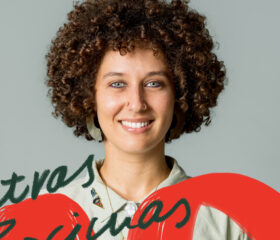

Ana Portnoy Brimmer
Ana Portnoy Brimmer nació en Troy, Nueva York, y se crio en Mayagüez, Puerto Rico. Actualmente vive en Puerto Rico. Es poeta, traductora, productora de impacto y gestora cultural.
Sus publicaciones más recientes incluyen To Love an Island (YesYes Books, 2021); Que tiemble (La Impresora, 2023); y Aimer une île, traducido por Benjamin Haroun Montesano (Editorial Pulpo, 2025).
“Recibir esta beca significa para mí: saberme – humildemente – parte de una gran comunidad de escritores puertorriqueñes que trabajan nuestro imaginario colectivo y memoria histórica; sustento; la posibilidad de habitarme más plenamente desde mi primer amor: la poesía”.
Ana Portnoy Brimmer was born in Troy, New York, and raised in Mayagüez, Puerto Rico and currently lives in Puerto Rico. She is a poet, translator, impact producer, and cultural organizer. Her recent publications include To Love an Island (YesYes Books, 2021); Que tiemble (La Impresora, 2023); and Aimer une île, translated by Benjamin Haroun Montesano (Editorial Pulpo, 2025).
“To receive this fellowship means for me: to know myself—humbly—as part of a great community of Puerto Rican writers who work with our collective imagination and historical memory; sustenance; and the possibility of inhabiting myself more fully through my first love: poetry.”
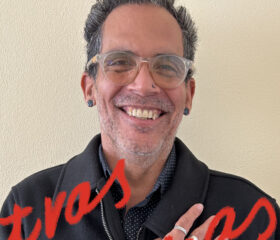

Juan Carlos Quiñones
Juan Carlos Quiñones nació en Santurce y se crio en Río Piedras. Reside en Puerto Rico la mayor parte del tiempo. Es un artista de la palabra que publica ocasionalmente bajo el pseudónimo de Bruno Soreno.
Durante los últimos diez años ha publicado los siguientes libros: El libro de las apariencias (Premio Nacional ICP 2023, Editorial del Instituto de Cultura Puertorriqueña, 2025); La isla de las salamandras (Ediciones Elvira/Soreno, 2025); Almanaque Indestructible (Ediciones Elvira/Soreno, 2023); Libro de cuentas / Calendario Carmesí (Ediciones Elvira/Soreno, 2023); Adelaida recupera su peluche (2da. edición, Ediciones Laberinto, 2022) y Bar Schopenhauer (Ediciones UNE, 2015).
“Esta beca cimenta el lugar de mi obra en las letras boricuas, y me brinda la oportunidad de continuar practicando el oficio apasionado de la literatura. En concreto, hará posible el viaje de investigación para una novela que estoy escribiendo”.
Juan Carlos Quiñones was born in Santurce and raised in Río Piedras and resides most of the time in Puerto Rico. He is a literary artist that sometimes publishes under the pseudonym “Bruno Soreno”.
Over the past ten years, he has published the following books: El libro de las apariencias (ICP National Award 2023, Editorial del Instituto de Cultura Puertorriqueña, 2025); La isla de las salamandras (Ediciones Elvira/Soreno, 2025); Almanaque Indestructible (Ediciones Elvira/Soreno, 2023); Libro de cuentas / Calendario Carmesí (Ediciones Elvira/Soreno, 2023); Adelaida recupera su peluche (2nd edition, Ediciones Laberinto, 2022); and Bar Schopenhauer (Ediciones UNE, 2015).
“This fellowship strengthens the place of my work within Puerto Rican letters and gives me the opportunity to continue practicing the passionate craft of literature. Specifically, it will make possible a research trip for a novel that I am currently writing.”
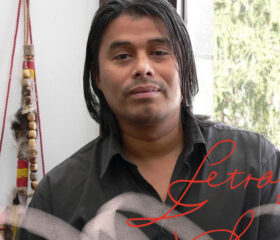

Ernesto Quiñonez
Ernesto Quiñonez se crio en “El Barrio”, Spanish Harlem, Nueva York, de padre comunista ecuatoriano y madre testigo de Jehová de Mayagüez. Actualmente vive en Washington Heights, Nueva York. Es novelista aclamado, ensayista, guionista y narrador oral del Moth, y enseña en la Universidad de Cornell. Entre sus publicaciones más recientes se encuentra la novela Taína (Random House, 2019).
“Pimero, con toda humildad, acepto este honor ofrecido por mi propia gente, pensando en aquellos escritores del pasado que lo merecían más, como Edward Rivera, Pedro Juan Soto y, por supuesto, Julia. Existo gracias a ellos”.
Ernesto Quiñonez was raised in “El Barrio,” Spanish Harlem, New York, by a communist Ecuadorian father and a Jehovah’s Witness mother from Mayagüez. He currently lives in Washington Heights, New York. He is an acclaimed novelist, essayist, screenwriter, and storyteller for The Moth, and teaches at Cornell University. His most recent publication is the novel Taína (Random House, 2019).
“First, with total humility I accept this honor given to me by my own, thinking of those past writers more deserving, the likes of Edward Rivera, Pedro Juan Soto, and of course Julia. I exist because of them.”
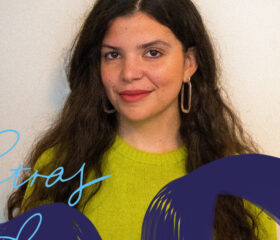

Katerina I. Ramos-Jordán
Katerina I. Ramos-Jordán nació en San Juan, Puerto Rico, y se crio entre Trujillo Alto y San Juan. Actualmente vive en Providence, Rhode Island. Es poeta, traductora, investigadora y artista del movimiento.
Entre sus publicaciones recientes se encuentran “Furcarea tuberosa (1933) Maguey” (Candela Review 4), Echoe-sistemas /lentos cerramientos/ (Center for Book Arts, Nueva York, 2020) y Puerto Rico en mi corazón (Anomaly, 2019).
“Recibir esta beca para mí es una señal alentadora para seguir creando y desarrollándome como escritora y artista y asumir la responsabilidad de la palabra con intención, humildad y plenitud creativa. Este apoyo me proveerá los recursos para desarrollar procesos de escritura multi-disciplinarios, a través de la creación de un archivo audiovisual, que me ayudará a expandir mi trabajo más allá de la página. Es un vehículo único, tanto material como simbólico, para impulsarme sin miedo a contribuir y co-crear al diálogo literario en Puerto Rico, el Caribe y sus diásporas”.
Katerina I. Ramos-Jordán was born in San Juan, Puerto Rico, and raised between Trujillo Alto and San Juan. She currently lives in Providence, Rhode Island. She is a poet, translator, researcher, and movement artist.
Her recent publications include “Furcarea tuberosa (1933) Maguey” (Candela Review 4), Echoe-sistemas /lentos cerramientos/ (Center for Book Arts, NYC, 2020), and Puerto Rico en mi corazón (Anomaly, 2019).
“To receive this fellowship is an encouraging sign to continue creating and growing as a writer and artist, and to embrace the responsibility of the word with intention, humility, and creative fullness. This support will provide me with the resources to develop multidisciplinary writing processes through the creation of an audiovisual archive, which will help me expand my work beyond the page. It is a unique vehicle—both material and symbolic—that will empower me to contribute to and co-create the literary dialogue in Puerto Rico, the Caribbean, and their diasporas without fear.”
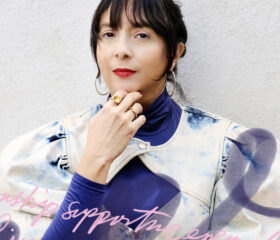

Lilliam Rivera
Lilliam Rivera nació en Nueva York y se crio en el Bronx, Nueva York. Actualmente vive en Los Ángeles, California. Es novelista de múltiples géneros, ensayista y guionista. Sus publicaciones más recientes incluyen los libros The Education of Margot Sanchez (2017), Dealing in Dreams (2019), Goldie Vance: The Hotel Whodonit (2020), Never Look Back (2020, galardonado con el Pura Belpré Honor Book 2021), Goldie Vance: The Hocus-Pocus Hoax (2021), Unearthed: A Jessica Cruz Story (2021) y We Light Up the Sky (2021).
Entre sus artículos destacan “In Praise of Esmeralda Santiago” (New York Times, 2019), “What Puerto Rico’s Protestors Can Teach the Rest of Us” (Washington Post, 2019), “Talking to My Parents About Colorism Is an Act of Love” (BuzzFeed, 2020) y “How One Latina Reclaimed the Color Red” (Elle Magazine, 2024). Como guionista, escribió para Love In Gravity, Temporada 2, una serie de pódcast episódica nominada a un premio GLAAD en 2024.
“Estaré en comunidad con quienes forjan este camino creativo en Puerto Rico y a través de la diáspora. Muchos escritores que me han inspirado han recibido esta beca (Jaquira Díaz, Willie Perdomo, Charles Rice-González…), y me honra formar parte de una familia tan sólida. La beca también me permitirá terminar mi obra de ficción actual, Luz is on Fire, una novela sobre la invisibilidad de las latinas de mediana edad, contada con un tono humorístico y oscuro”.
Lilliam Rivera was born in New York and raised in the Bronx, New York. She currently lives in Los Angeles, California. She is a multi-genre novelist, essayist, and screenwriter.
Her most recent publications include the books The Education of Margot Sanchez (2017), Dealing in Dreams (2019), Goldie Vance: The Hotel Whodonit (2020), Never Look Back (2020, awarded a 2021 Pura Belpré Honor Book), Goldie Vance: The Hocus-Pocus Hoax (2021), Unearthed: A Jessica Cruz Story (2021), and We Light Up the Sky (2021). Her articles include “In Praise of Esmeralda Santiago” (New York Times, 2019), “What Puerto Rico’s Protestors Can Teach the Rest of Us” (Washington Post, 2019), “Talking to My Parents About Colorism Is an Act of Love” (BuzzFeed, 2020), and “How One Latina Reclaimed the Color Red” (Elle Magazine, 2024). As a screenwriter, she wrote for Love In Gravity, Season 2, an episodic podcast series nominated for a 2024 GLAAD Award.
“I will be in a community with those forging this creative path in Puerto Rico and across the diaspora. So many writers who have inspired me have received this fellowship (Jaquira Diaz, Willie Perdomo, Charles Rice-Gonzalez…) and I am honored to be a part of such a strong family. The fellowship will also allow me to finish my current work of fiction titled Luz is on Fire, a novel about the invisibility of middle-aged Latinas told through a humorous and dark lens.”
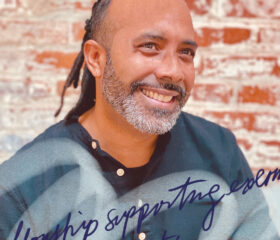

Lucas Rivera
Lucas Rivera nació en Salinas, Puerto Rico, y se crio en los barrios del Bronx y el norte de Filadelfia. Actualmente vive en Los Ángeles. Es un artista multidisciplinario afro-puertorriqueño, escritor y estratega cultural, cuyo trabajo reimagina y redefine narrativas, empoderando a comunidades de color y reclamando espacios como sitios de poder, posibilidad y pertenencia.
Entre sus publicaciones se encuentran secciones de Love Poem en Viral Justice de la Dra. Ruha Benjamin (Princeton University Press, 2022), su libro My AfroRican State of Soul (World Stage Press, 2023) y Not About the Color of Our Skin (Kisman Quarterly, 2025). Actualmente desarrolla Negrito: Stories from the Shaded Hood of North Philly.
“Recibir esta beca es ser visto y celebrado como afro-puertorriqueño que ha pasado décadas proclamando “We Belong Here”, anclado a una isla que guarda mi espíritu, mis palabras, mi música, mis colores y mi danza”.
Lucas Rivera was born in Salinas, Puerto Rico, and raised in the hoods of the Bronx and North Philadelphia. He currently lives in Los Angeles. Lucas is a multidisciplinary Afro-Puerto Rican artist, writer, and cultural strategist whose work reimagines and redefines narratives, lifting communities of color and reclaiming spaces as sites of power, possibility, and belonging.
His publications include sections of Love Poem in Viral Justice by Dr. Ruha Benjamin (Princeton University Press, 2022), his book My AfroRican State of Soul (World Stage Press, 2023), and Not About the Color of Our Skin (Kisman Quarterly, 2025). He is currently developing Negrito: Stories from the Shaded Hood of North Philly.
“To receive this fellowship is to be seen and celebrated as an Afro-Puerto Rican who has spent decades declaring “We Belong Here,” tethered to an island that holds my spirit, my words, my music, mis colores, and my dance.”
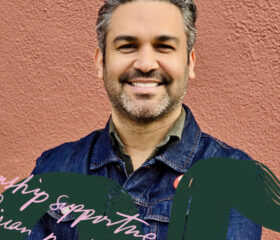

Ángel Antonio Ruiz Laboy
Ángel Antonio Ruiz Laboy nació en Ponce y se crio en Puerto Rico. Actualmente vive en la ciudad de Nueva York. Es escritor, profesor y editor. Su publicación más reciente, además de varios ensayos sobre crítica de arte, es la segunda edición de Cartografía del Polvo (Riel Editores, 2024).
“Recibir esta beca significa para mí la oportunidad de celebrar mi escritura dentro la diversidad de la literatura puertorriqueña. En muchas ocasiones mi tarea de gestor, editor o profesor ha opacado el trabajo creativo que llevo haciendo por años y este es un recordatorio de la sed que me trae aquí, a la literatura, mi deseo creativo”.
Ángel Antonio Ruiz Laboy was born in Ponce and raised in Puerto Rico; he currently lives in New York City. He is a writer, professor, and editor. His most recent publication, in addition to several essays on art criticism, is the second edition of Cartografía del Polvo (Riel Editores, 2024).
“To me, receiving this fellowship means the opportunity to celebrate my writing within the diversity of Puerto Rican literature. On many occasions, my work as a cultural organizer, editor, or teacher has overshadowed the creative work I have been doing for years, and this is a reminder of the thirst that brings me here—to literature, to my creative desire.”
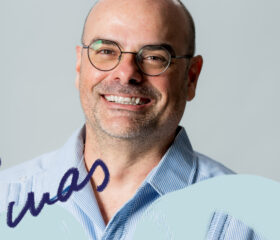

Luis Trelles
Luis Trelles nació en San Juan y se crio en el vecindario Baldrich, en Hato Rey; actualmente vive cerca de la casa donde nació. Es escritor y periodista, y se desempeña como editor de Embedded, el pódcast de series documentales de NPR.
Comenzó su carrera en el periodismo de audio en Radio Ambulante, donde escribió y produjo crónicas desde Puerto Rico, Cuba, República Dominicana y Centroamérica. Su trabajo también abarca el cine: es co-guionista de la película puertorriqueña Picando Alante (2022) y ha colaborado en otros proyectos cinematográficos.
“Recibir esta beca es una profunda validación. Aunque he desarrollado mi carrera escribiendo para cine y pódcasts, mi mayor satisfacción como autor siempre ha estado en los libros, pues ningún formato iguala la conexión íntima que se crea entre un lector y un texto escrito con el corazón en la mano. Este reconocimiento es doblemente significativo porque apoya la creación de literatura hecha desde y para Puerto Rico, dándome la oportunidad de escribir para una comunidad de lectores que busca reconocer nuestra propia realidad en sus lecturas”.
Luis Trelles was born in San Juan and raised in the Baldrich neighborhood in Hato Rey; he currently lives near the home where he was born. He is a writer and journalist and serves as the editor of Embedded, NPR’s documentary podcast series.
He began his career in audio journalism at Radio Ambulante, where he wrote and produced stories from Puerto Rico, Cuba, the Dominican Republic, and Central America. His work also extends to film: he is the co-writer of the Puerto Rican film Picando Alante (2022) and has contributed to other cinematic projects.
“To receive this fellowship is a profound validation. Although I have built my career writing for film and podcasts, my greatest satisfaction as a writer has always been found in books, since no other medium matches the intimate connection that forms between a reader and a text written with one’s heart in hand. This recognition is doubly meaningful because it supports the creation of literature made from and for Puerto Rico, giving me the opportunity to write for a community of readers who seek to recognize our own reality in their reading.”
Selection Committee
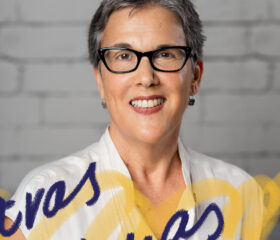

Sofía Irene Cardona
Sofía Irene Cardona es escritora y catedrática del Departamento de Estudios Hispánicos de la Universidad de Puerto Rico (UPR), Recinto de Río Piedras. Doctora en Literatura Española por la Universidad de Massachusetts en Amherst, su investigación se ha centrado en la ironía en la literatura hispánica del siglo XX y continúa explorando este tema en diversos géneros y autores.
Ha publicado libros de poesía, narrativa, crónicas y literatura infantil, entre ellos La habitación oscura (2006), El libro de las imaginadas —Premio Nacional de Narrativa del Pen Club de Puerto Rico y Segundo Premio del Instituto de Literatura Puertorriqueña—, Desde la quinta nube (2016) y Todo pasa (2024). En literatura infantil destacan La maravillosa visita del calzadísimo extranjero —Primer Premio de Cuento Infantil El Nuevo Día/Editorial Santillana— y Los tres Jacobos(EDUPR, 2025).
Cardona también es coautora de antologías como Fuera del quicio (2007), Del desorden habitual de las cosas (2015), No pasa nada (2020) y Será otra cosa (2023), además de colaborar con la sección «Será otra cosa» del suplemento cultural En Rojo del periódico Claridad. Ha participado en congresos y ferias literarias internacionales, incluyendo la Feria del Libro de Guadalajara, la Feria Internacional del Libro de Venezuela y las Jornadas Pellicerianas en México.
Sofía Irene Cardona is a writer and professor in the Department of Hispanic Studies at the University of Puerto Rico, Río Piedras Campus. She holds a PhD in Spanish Literature from the University of Massachusetts, Amherst, with research focused on irony in 20th-century Hispanic literature.
Cardona has published works in poetry, fiction, chronicles, and children’s literature, including The Dark Room (2006), The Book of Imaginaries—winner of the National Narrative Award from the Pen Club of Puerto Rico and Second Prize from the Institute of Puerto Rican Literature—From the Fifth Cloud (2016), and Everything Passes (2024). Her children’s books include The Marvelous Visit of the Most Shod Stranger—First Prize for Children’s Stories from El Nuevo Día/Editorial Santillana—and The Three Jacobs (EDUPR, 2025).
She is also co-author of anthologies such as Fuera del quicio (2007), Del desorden habitual de las cosas (2015), No pasa nada (2020), and Será otra cosa (2023), and contributes to the “Será otra cosa” section of the cultural supplement En Rojo in Claridad. Cardona has participated in major international literary events, including the Guadalajara Book Fair, the Venezuela International Book Fair, and the Jornadas Pellicerianas in Mexico.
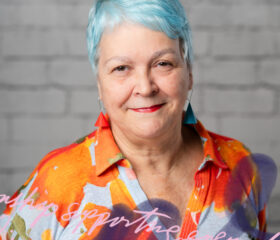

Vanessa Droz
Vanessa Droz (Vega Baja, Puerto Rico, 1952) es poeta, escritora y gestora cultural, con una destacada trayectoria en la literatura y las artes plásticas. Autora de poemarios reconocidos como La cicatriz a medias —mejor libro de poesía según El Nuevo Día en 1982—, Vicios de ángeles y otras pasiones privadas —Primer premio del Instituto de Literatura Puertorriqueña— y Estrategias de la catedral —finalista del certamen de poesía del ICP—, su obra también incluye libros como Las cuatro estaciones-Suite caribeña, Bambú y otros horizontes y Permanencia en puerto. En 2024, la Editorial de la Universidad de Puerto Rico publicó Animal mirado, una antología de su poesía.
Ha representado a Puerto Rico en múltiples encuentros literarios internacionales y su obra ha sido incluida en numerosas antologías en el país y el extranjero. Fue presidenta de PEN Puerto Rico y ha colaborado con instituciones culturales en distintos roles, desde la edición hasta la curaduría, como en Viejo San Juan-Te amo-Un homenaje (2022).
Entre sus reconocimientos se encuentran el Premio Nacional San Sebastián (2008) y un homenaje de De Paul University y la revista Contratiempo (2018). Además de su faceta literaria, ha ejercido como periodista, columnista, fotógrafa, gestora cultural y editora, y actualmente continúa desarrollando su trabajo poético y editorial.
Vanessa Droz (Vega Baja, Puerto Rico, 1952) is a poet, writer, and cultural manager with a distinguished career in literature and the visual arts. She is the author of acclaimed poetry collections including La cicatriz a medias (The Half Scar)—named Best Poetry Book by El Nuevo Día in 1982—Vicios de ángeles y otras pasiones privadas (First Prize, Institute of Puerto Rican Literature), and Estrategias de la catedral (Cathedral Strategies), a finalist in the ICP Poetry Competition. Her later works include Las cuatro estaciones – Suite caribeña (The Four Seasons – Caribbean Suite), Bambú y otros horizontes (Bamboo and Other Horizons), and Permanencia en puerto (Permanence in Port). In 2024, the University of Puerto Rico Press published Animal Mirado, an anthology of her poetry.
Droz has represented Puerto Rico at numerous international literary events, and her work has been widely anthologized both locally and abroad. She served as president of PEN Puerto Rico and has collaborated with major cultural institutions as editor and curator, including the project Viejo San Juan – Te amo – Un homenaje (2022).
Her honors include the San Sebastián National Prize (2008) and a 2018 tribute by De Paul University and Contratiempo magazine. Alongside her literary career, she has been a journalist, columnist, photographer, cultural manager, and editor, and continues to expand her poetic and editorial work.
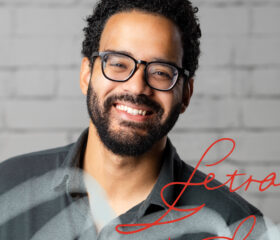

Sergio Gutiérrez Negrón
Sergio Gutiérrez Negrón (Caguas, 1986) ha publicado las novelas Los días hábiles, Palacio, y Dicen que los dormidos y la colección de cuentos Preciosos perdedores. Es traductor de varios libros, entre ellos Volcán: Memoria de Montserrat de Yvonne Weekes. También es co-editor de la revista y proyecto editorial La pequeña. En el 2017, fue seleccionado por el Hay Festival como parte de Bogotá39, un listado de 39 escritores prometedores del continente menores de 39. Dos años antes, en el 2015, fue reconocido por el Festival de la Palabra con el Premio Nuevas Voces, un premio otorgado a autores puertorriqueños jóvenes. Ese mismo año fue parte de Latinoamérica Viva, una selección de autores latinoamericanos noveles curada por la Feria Internacional del Libro de Guadalajara. Escribió columnas para El Nuevo Día por nueve años. Sus cuentos, ensayos y crónicas han aparecido en varias revistas y periódicos, entre estos World Literature Today, Casa de las Américas (Cuba), Centro (Colombia) y Clarín (Argentina). Es profesor de literatura y estudios culturales en Oberlin College.
Sergio Gutiérrez Negrón (Caguas, 1986) is the author of the novels Los días laborales (Business Days), Palacio (Palace), and Dicen que los duermen (They Say the Asleep), as well as the short story collection Preciosos perdedores (Precious Losers). He has translated several works, including Yvonne Weekes’s Volcán: Memoria de Montserrat, and is co-editor of the magazine and publishing project La pequeña.
Recognized as one of Latin America’s most promising voices, Gutiérrez Negrón was named to Bogotá39 by the Hay Festival in 2017 and received the Nuevas Voces Award from the Festival de la Palabra in 2015. That same year, he was selected for Latinoamérica Viva at the Guadalajara International Book Fair.
His work—including short stories, essays, and chronicles—has appeared in World Literature Today, Casa de las Américas, Centro, Clarín, and other international publications. He is currently Professor of Literature and Cultural Studies at Oberlin College.


Jorge B. Merced
Jorge B. Merced es un artista, director y dramaturgo puertorriqueño de gran reconocimiento en Estados Unidos y el extranjero. Nacido en Carolina, Puerto Rico, se graduó de la Escuela Libre de Música de San Juan, estudió teatro en City College-CUNY y completó formación avanzada en la Escuela Internacional de Teatro de América Latina y el Caribe en Cuba, donde se entrenó con Osvaldo Dragún, Eugenio Barba y el colectivo Yuyachkani. También con Augusto Boal en Brasil y Francia. En Nueva York se desempeña como Director Artístico Asociado de Pregones/Puerto Rican Traveling Theater, donde ha dirigido numerosas producciones principales desde 1987.
Su liderazgo ha sido decisivo en el desarrollo del repertorio original de la compañía, los programas artísticos intergeneracionales y el emblemático Asunción Playwrights Project de dramaturgia LGBTQIA+. Entre sus distinciones también figuran el Premio Simón Bolívar a la Trayectoria Artística otorgado por la Universidad de la Ciudad de NY (CCNY, 2022), y el BRIO Award del Bronx Council on the Arts.
Es miembro del Comité de Nominación de los premios de teatro Off-Broadway Lucille Lortel, y ha sido panelista para NYS Council on the Arts, el Departamento de Asuntos Culturales de NYC y la National Association of Latino Arts and Culture (NALAC). Su trayectoria lo confirma como una de las voces más influyentes del teatro puertorriqueño contemporáneo en la diáspora.
Jorge B. Merced is a Puerto Rican artist, director, and playwright recognized both in the United States and internationally. Born in Carolina, Puerto Rico, he studied music at the Escuela Libre de Música de San Juan and theater at City College-CUNY, and completed advanced training at the International Theater School of Latin America and the Caribbean in Cuba, working with Osvaldo Dragún, Eugenio Barba, and the Yuyachkani collective. He also trained with Augusto Boal in Brazil and France.
Since 1987, Merced has served as Associate Artistic Director of Pregones/Puerto Rican Traveling Theater in New York, directing numerous mainstage productions and contributing significantly to the Puerto Rican and Latinx theater community.
Merced’s leadership has been instrumental in developing Pregones/Puerto Rican Traveling Theater’s original repertoire, intergenerational artistic programs, and the iconic Asunción Playwrights Project for LGBTQIA+ theater. His honors include the Simón Bolívar Lifetime Achievement Award from the City University of New York (CCNY, 2022) and the BRIO Award from the Bronx Council on the Arts.
He serves on the Nominating Committee for the Lucille Lortel Off-Broadway Theatre Awards and has been a panelist for the NYS Council on the Arts, the NYC Department of Cultural Affairs, and the National Association of Latino Arts and Culture (NALAC). Merced is recognized as one of the most influential voices in contemporary Puerto Rican theater in the diaspora.
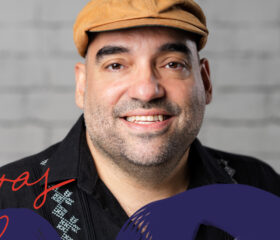

Urayoán Noel
Urayoán Noel, poeta, traductor y académico puertorriqueño, es autor de diez libros, entre ellos In Visible Movement: Nuyorican Poetry from the Sixties to Slam —ganador del Premio de Libro de la Sección de Estudios Latinos de LASA— y los poemarios Boringkén y Transversal, reconocidos como libros del año por El Nuevo Día y la Biblioteca Pública de Nueva York.
Becario de Letras Boricuas 2022, Noel ha participado en festivales internacionales como Barcelona Poesía, Poesiefestival Berlin y la Bienal de Arte de Toronto, y sus poemas digitales han sido exhibidos en el Museo de la Ciudad de Nueva York y Lit(e)Lat.
Además de publicar en medios como The New York Times y Poetry, Noel es miembro de la junta directiva del Centro Cultural y Educativo Clemente Soto Vélez y Centro Press, y editor en jefe de Intervenxions en The Latinx Project de la Universidad de Nueva York, donde también enseña literatura y escritura creativa.
Urayoán Noel is a poet, translator, and scholar from Río Piedras, Puerto Rico, and the author of ten books, including In Visible Movement: Nuyorican Poetry from the Sixties to Slam—winner of the LASA Latino Studies Section Book Prize—and the poetry collections Boringkén and Transversal, both named books of the year by El Nuevo Día and the New York Public Library, respectively.
His translations include Architecture of Dispersed Life: Selected Poetry by Pablo de Rokha, a finalist for the National Translation Award. A 2022 Letras Boricuas Fellow, Noel has performed at Barcelona Poesia and Poesiefestival Berlin, with digital poems exhibited by the Museum of the City of New York and Lit(e)Lat.
Noel’s work has appeared in The New York Times, El canon abierto, and numerous other publications. He serves on the boards of the Clemente Soto Vélez Cultural and Educational Center and Centro Press, is editor-in-chief of Intervenxions at NYU’s Latinx Project, and teaches in the departments of English, Spanish and Portuguese, and the MFA in Creative Writing in Spanish at NYU, as well as in Stetson University’s low-residency MFA program.